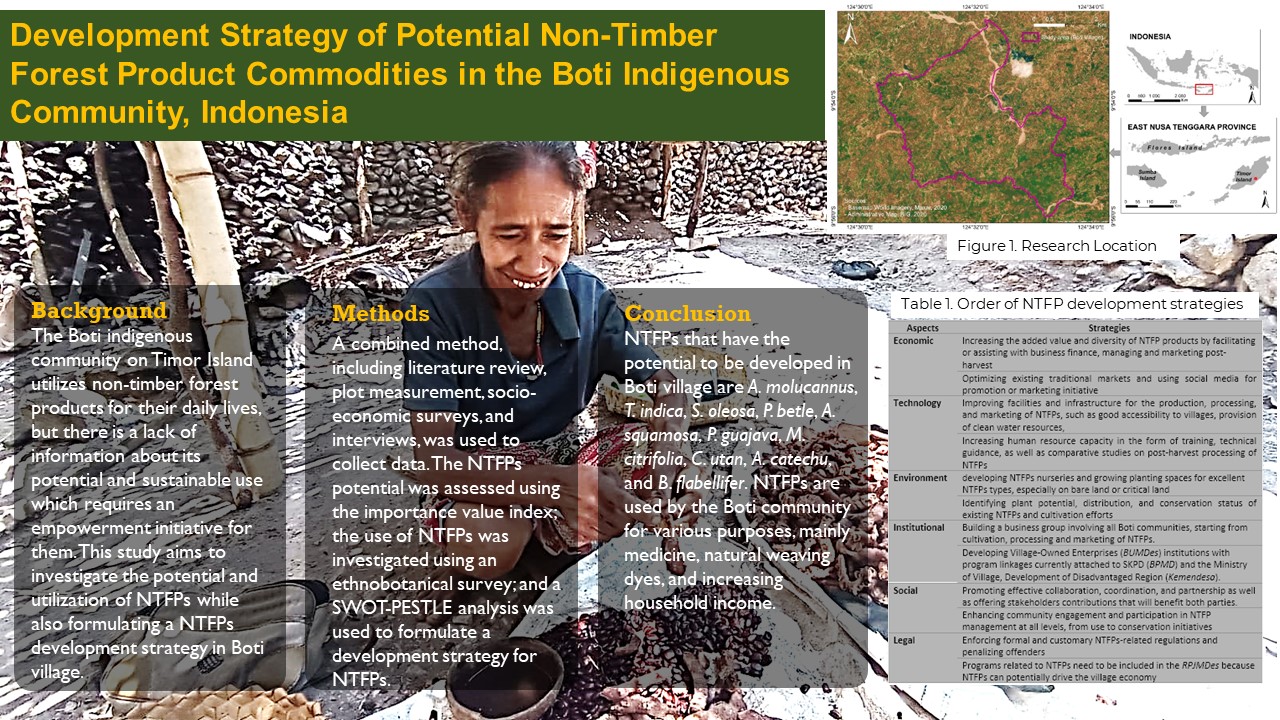Stakeholder Management of Kawasan Konservasi Mangrove dan Bekantan in Tarakan City
Abstract
References
Bungin, B. (2010). Penelitian kualitatif. Jakarta: Kencana Prenada Media Grup.
Bryson, J. M., Patton, M. Q., & Bowman, R. A. (2011). Working with evaluation stakeholders: A rationale, step-wise approach. Evaluation and Program Planning, 34, 1–12.
https://doi.org/10.1016/j.evalprogplan.2010.07.001
Clarkson, M. B. E. (1995). A stakeholder framework for analyzing and evaluating corporate social performance. The Academy of Management Review, 20, 92–117. tps://doi.org/10.5465/amr.1995.9503271994
Driscoll, C., & Starik, M. (2004). The primordial stakeholder: Advancing the conceptual consideration of stakeholder status for the natural environment. Journal of Business Ethics, 49, 55–73. https://doi.org/10.1023/B:BUSI.0000013852.62017.0e
Febriyano, I. G. (2014). Politik ekologi pengelolaan mangrove di Kabupaten Pesawaran Provinsi Lampung [dissertation]. Bogor: Bogor Agricultural University
Freeman, R. E., & McVea, J. (1984). A stakeholder approach to strategic management. Charlottesville: University of Virginia Press.
Galbraith, J. K. (1983). The anatomy of power. Boston: Houghton Mifflin. https://doi.org/10.1080/05775132.1983.11470852
Krott, M., Bader, A., Schusser, C., Devkota, R., Maryudi, A., Giessen, L., & Aurenhammer, H. (2014). Actor-centred power: The driving force in decentralised community based forest governance. Forest Policy and Economics, 49, 34–42. https://doi.org/10.1016/j.forpol.2013.04.012
Maguire B, Potss J, Fletcher S. 2012. The role of stakeholders in themarine planning process-stakeholder analysis within the Solent, United Kingdom. Marine Policy 36, 246–257. https://doi.org/10.1016/j.marpol.2011.05.012
Manullang, S. (2018). Teori dan teknik analisis stakeholder: Untuk manajemen proyek, organisasi, bisnis, kajian isu/kebijakan, politik, dan keseharian anda. Bogor: IPB Press.
Mitchell, R. K., Agle, B. R., & Wood, D. J. (1997). Toward a theory of stakeholder identification and salience: Defining the principle of who and what really counts. The Academy of
Management Review, 22, 853–886. https://doi.org/10.5465/amr.1997.9711022105
Parent, M. M., & Deephouse, D. L. (2007). A case study of stakeholder identification and prioritization by managers. Journal of Business Ethics, 75, 1–23. https://doi.org/10.1007/s10551-007-9533-y
Reed, M., Graves, A., Dandy, N., Posthumus, H., Hubacek, K., Morris, J., ... Stringer, L. C. (2009). Who's and why? A typology of stakeholder analysis methods for natural resource management. Journal of Environmental Management, 90, 1933–1949. https://doi.org/10. 1016/j.jenvman.2009.01.001
Siregar, M. (2011). Peran stakeholders terhadap pengembangan ekowisata di Taman Nasional Teluk Cenderawasih Kabupaten Teluk Wondama Provinsi Papua Barat. [essay]. Bogor: IPB Press.
Roslinda, E., Darusman D., Suharjito, D., & Nurrochmat, D. R. (2012). Stakeholders analysis on the management of Danau Sentarum National Park Kapuas Hulu Regency, West Kalimantan. Jurnal Manajemen Hutan Tropika, 2, 78–85. https://doi.org/10.7226/jtfm.18.2.78
Syahputra, O. K. H., Nugroho, B., Kartodihardjo, H., & Santoso, N. (2018). Stakeholder analysis in community based mangrove management: Case of forest management unit in Region 3 of Aceh Province. Jurnal Manajemen Hutan Tropika, 24, 152–161. https://doi.org/10.7226/jtfm.24.3.156
Wiharyanto, D. (2007). Kajian pengembangan ekowisata mangrove di Kawasan Konservasi Pelabuhan Tengkayu II Kota Tarakan Kalimantan Timur. [thesis]. Bogor: IPB University.
Authors

This work is licensed under a Creative Commons Attribution 4.0 International License.
Jurnal Manajemen Hutan Tropika is an open access journal which means that all contents is freely available without charge to the user or his/her institution. Users are allowed to read, download, copy, distribute, print, search, or link to the full texts of the articles in this journal without asking prior permission from the publisher or the author. This is in accordance with the Budapest Open Access Initiative (BOAI) definition of open access.






